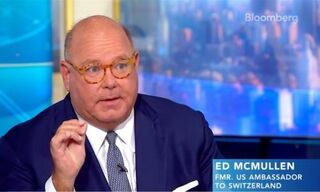In an interview with finews.com, Martin Hess, chief economist at the Swiss Bankers Association, hopes entrepreneurial incentives will outdo regulatory constraints in 2025.
Martin Hess, when you look back on 2024, what were the most formative developments in the Swiss financial industry?
I am pleased that the banks performed as successfully this year as we predicted in our «Swiss Banking Outlook». Customers trust their bank and are very satisfied with its services. This is the biggest highlight.
The environment was challenging. Still, Swiss companies are coping well with the economic downturn in important European markets and geopolitical tensions, and banks are also benefiting from this.
«There is a risk that the normalization of margins in the interest rate business was only short-lived»
The interest rate environment remains delicate. Following the repeated interest rate cuts by the Swiss National Bank (SNB), there is a risk that last year's normalization of margins in the interest rate business was only short-lived.
The banks provide essential services for the economy and are also important employers. What role did the Swiss financial industry play for the stability and prosperity of Switzerland in 2024?
Banks in Switzerland are reliable employers. The employees are satisfied and the fear of massive job losses after the collapse of Credit Suisse has so far not occurred.
According to a study by BAK Economics, the banking sector generates well over 5 percent of GDP thanks to its highly qualified workers. It also creates significant added value and jobs.
Economic success is important because, on the one hand, it helps banks to build up capital and enable future investments. On the other hand, the banking sector pays billions in taxes for the general public's benefit.
Where do you see a need for action in economic policy to ensure the competitiveness of the financial center in 2025?
Compared to other factors, regulation is considered the greatest risk to earnings in our «Swiss Banking Outlook». This must not be forgotten in the upcoming discussions about regulatory adjustments.
Proposals with a positive cost-benefit profile, such as those ensuring liquidity during a crisis for systemically important institutions, should be developed and decided upon quickly.
«The bureaucratic hurdles are too high for companies»
However, many would likely agree that in Switzerland, bureaucratic obstacles for companies and the proportion of profits allocated to the state are currently excessive. In my view, political reliability must increase again. This is especially crucial for strategic investment decisions and, consequently, for Switzerland's competitiveness.
Artificial intelligence (AI) and changing customer expectations are shaping the future of banks. How should banks prepare for this?
AI will remain a dominant topic for banks in 2025. AI promises great added value both for optimizing business processes and strategic planning. This results in improved customer service and the potential for additional earnings.
AI has already become indispensable for risk minimization, for example, in the fight against financial crime or the pursuit of ESG goals in the financial industry.
«Framework conditions that allow innovation are a prerequisite for Switzerland to remain competitive»
In step with applying AI, calls for drastic regulation are also growing louder. In my opinion, Swiss legislation would do well to remain true to the tradition of technology-neutral, principle-based regulation.
Appropriate framework conditions that allow innovation are requisite for Switzerland to play a pioneering role in AI and remain competitive.
How does the Swiss Bankers Association (SBA) contribute to advancing the banks' concerns in the political and public discussion?
Banking – with its many connections to other economic sectors and society – is one of the most heavily regulated sectors. The SBA's tasks are correspondingly broad.
Personally, I think our commitment to entrepreneurial freedom and open markets is crucial. Thought leadership is of central importance so that framework conditions effectively address the risks but also allow banks to remain competitive with innovative solutions for the benefit of their customers.
My wish is that by 2025, entrepreneurial incentives will outdo regulatory constraints.
Martin Hess has worked in various functions for the Swiss Bankers Association (SBA) for almost 15 years. He has been chief economist and head of economic policy since July 2020. He studied at the University of Rochester and at the University of Bern, where he also received his doctorate.





























